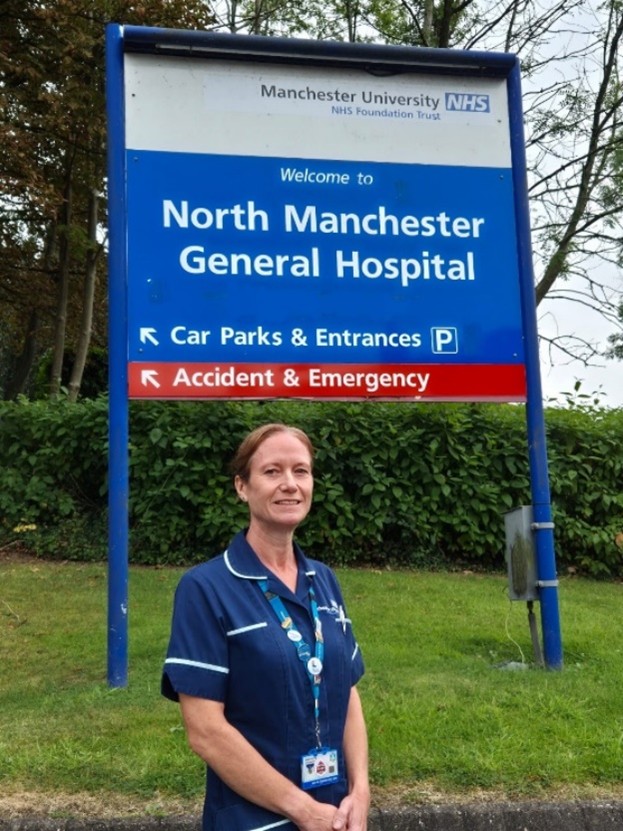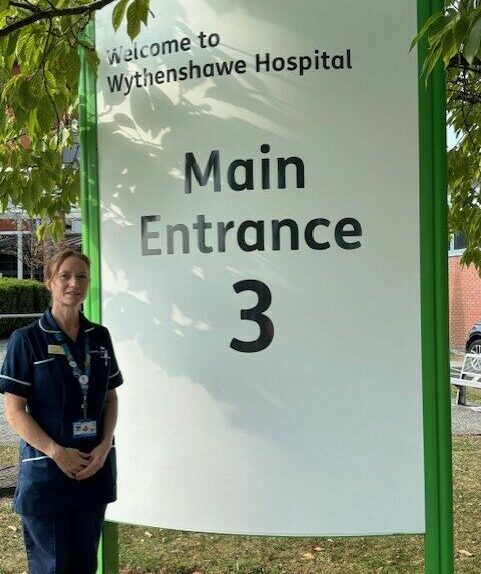Friday 19 September 2025
Advanced Nurse Practitioner (ANP), Sue Stockdale (pictured) has previously shared her career journey from a trainee to a newly qualified ANP in clinical research.
Now firmly embedded in her role, Sue shares her pride in how she has developed and expanded her remit to become a Principal Investigator (PI) at the National Institute for Health and Care Research (NIHR) Manchester Clinical Research Facility (CRF). She also shares how the NIHR Principal Investigator Pipeline Programme is playing an important role in this achievement and why she would highly recommend this research path to other ANPs.

“Although advancing from a research nurse to an ANP three years ago gave me autonomy and clinical decision making in my role, it has always been my long-term goal to develop further skills and become a Principal Investigator (PI) on a clinical trial.
PIs have the overall responsibility for how a trial is delivered, from designing recruitment strategies to ensuring staff are delegated and trained appropriately. They oversee the day-to-day operations, ensure compliance with regulations, and are accountable for the study’s success.
Since my qualification as an ANP in 2022, I have performed the role of a Sub-Investigator on trials, where I have been responsible for the safety and clinical review of patients. As Sub-Investigator I have supported numerous PIs and gradually expanded my knowledge and skills in this area, as I knew I wanted to take the next step in my career and become a PI.
My first Principal Investigator role
In summer 2024, after a competitive application process, I was excited to be accepted onto the NIHR Principal Investigator Pipeline Programme (PIPP). The PIPP offers research delivery nurses, midwives, and allied health professionals in England the opportunity to develop as Principal Investigators on NIHR portfolio studies.
Through this programme, I currently have my first opportunity to act as a PI on the “Breeze-2” trial. Breeze-2 is an intervention study to help breathlessness in patients with pulmonary fibrosis – a condition in which the lungs become scarred, and breathing becomes increasingly difficult.
Side effects for approved drugs within this patient group are common. So, offering an alternative safe, non-drug clinical trial has given these patients an important opportunity to take part in research and to help find alternative solutions for their breathing difficulties. The study is being delivered across two of the NIHR Manchester CRF’s sites, at Wythenshawe Hospital and North Manchester General Hospital (NMGH).
Breathlessness can make hospital attendance challenging. I have delegated and trained colleagues who will work across both sites to deliver the study, giving patients more choice of where to attend for their appointments and therefore accessibility to the study. Putting patients’ needs first is important to me as a PI. This model of a fluid mobile workforce that moves to meet the needs of the patient can help reduce barriers to accessing research. I have also been able to reassure my trial patients of the support I have, with two dedicated specialist consultants as my Sub-Investigators, one at each site. Drawing on their expertise has been imperative for the success of the trial. I’m pleased to say we have already almost hit our recruitment target and are looking to over-recruit.

The NIHR Principal Investigator Pipeline Programme
The NIHR Principal Investigator Pipeline Programme is a 12 to18-month structured programme, with two cohorts per year of around 30 participants. The course consists of 4 elements and is a blend of structured lessons, e-learning, group discussion and reflection. Group work has been particularly useful to identify common challenges and share solutions and practical tips.
The programme is self-paced; this gives flexibility to allow cohorts to ensure they are exposed to a variety of experience and learning opportunities in the PI role. I have benefitted by being mentored by several of our consultants at Manchester University NHS Foundation Trust and in-turn, I am looking forward to mentoring others along their career journeys.
I believe my participation in this nationally recognised programme will be pivotal in taking my career to the next level and will also provide evidence and assurance to perspective study sponsors. I aim to complete the NIHR PI Pipeline Programme by early 2026.
This is not only a great career development opportunity for me but helps add capacity and capability to Manchester CRF, which through delivering early phase research, helps make a valuable contribution to the health of our local population.
I would like to take this opportunity to thank the consultant PIs, and the clinical delivery and operational teams at the Manchester CRF for their support. I would highly recommend participation in the NIHR PI Pipeline programme for any nurses, midwives and allied health professionals who want to develop their skills and knowledge in this area.”
Previous blogs can be found here:
-
Setting new challenges – by Sue Stockdale, Advanced Nurse Practitioner (March 2023)
-
Rising to new challenges – by Sue Stockdale, Trainee Advanced Nurse Practitioner February 2021)
